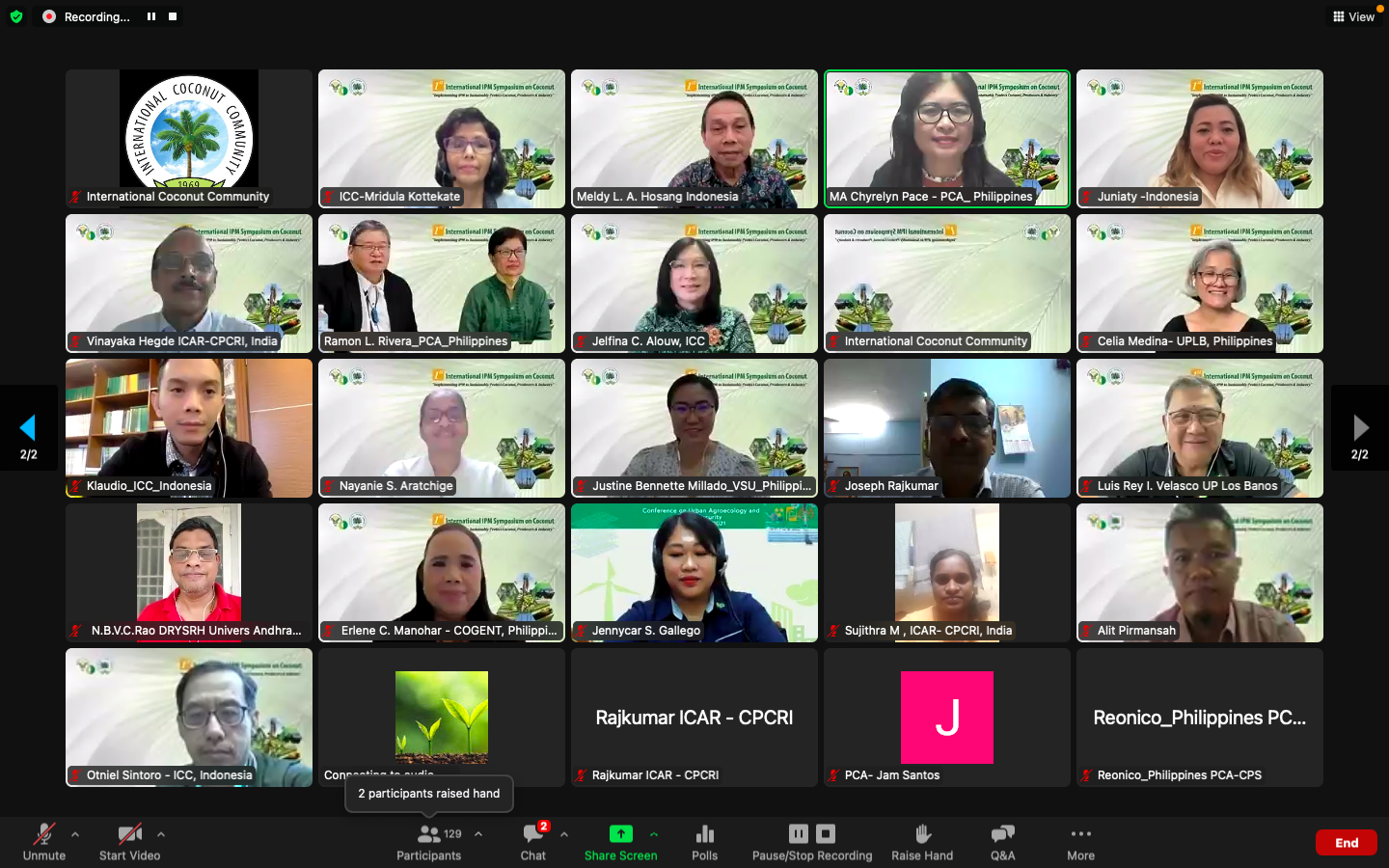International Coconut Community and the Philippines Coconut Authority organized the four-day 1st International Integrated Pest and Disease Management Symposium on Coconut virtually from 23-26 August 2022. The theme was: “Implementing IPM to Sustainably Protect Coconut, Producers and Industry”. The general objective of organizing the symposium is to establish an international IPM network system and synergy to protect the coconut producers & industries, conserve the coconut genetic resources and diversity from the adverse impact of pests and diseases through expertise and experience sharing.
The pest and disease experts from the different ICC member countries, universities, research institutes, and international organizations participated in the symposium and presented their most recent research and development in this sector. There were 193 participants from 34 countries attended the event. This symposium served as a venue for knowledge sharing amongst entomologists, pathologists and breeders for a concrete and innovative action toward protecting our crop and managing pests with minimal or no use of harmful chemicals.
The symposium started on 23 August with the welcome remarks by Mr. Benjamin R. Madrigal, Administrator, PCA. Mr. Benjamin expressed his gratitude that the ICC takes concrete steps to coordinate, promote and harmonize activities and efforts in the aspect of integrated pest management. He hoped that the symposium will strengthen the existing IPM strategies and further enhance the mechanisms for coordination among member countries to completely address the threats and challenges brought by the emerging coconut pests and diseases.
Dr. Jelfina C. Alouw, Executive Director, ICC, delivered the rationales and objectives of the Symposium. She mentioned that demand of coconut products is continuously growing, but pests and diseases reduce the ability of the industry to fully benefits from the market opportunities. Collaborative efforts among stakeholders are needed to address the issues in pest and disease management. She added that science innovation network, sustained support, and digital information system are essential to protect coconut palms, and to prevent the spread and the economic coconut yield losses. Therefore, ICC in collaboration with the Centre for Agriculture and Bioscience International (CABI), Malaysia, is launching the Cocopest portal. It is an e-information as a one-stop portal of major coconut pests and diseases and their management in coconut-growing countries, which will help the coconut farmers and stakeholders to have a first-hand idea of the major pests and diseases of coconut and they can reach out to experts for advice for managing the same in the field.
During the four-day virtual symposium, subject matter experts from UPLB, CABI, CSIRO, FAO, and DPP&Q-MAFW presented the state of the art of Integrated Pest and Disease Management (IPM) in three sessions as follows: Modelling and Decision Support System for IPM; Strengthening IPM to Increase Global Market Acceptability of Coconut Products; Biosecurity for Germplasm and Biocontrol Agent Movement.
The fourth session was Country Presentation-Related to Pest and Disease Challenges (New Emerging Pests) and Control Strategies, Policy Support, Economic, Sociological and Cultural Barriers/Boosters to the Adoption of the IPM Principles in which countries like India, Indonesia, Sri Lanka, Philippines, Pacific Country, Caribbean, and African countries status were presented.
A parallel session of 10 selected papers on biotechnology tools for pest and disease identifications and management, integrated management approach to coconut whitefly, and the roles of entomopathogens in IPM were presented by ten presenters. Q&A and discussions on different questions raised by the participants.
On the last day of the symposium the Establishing of IPM Networks were presented by Dr. Jelfina C. Alouw, Executive Director. She mentioned that the IPM concept needs to consider producers, consumers, and sustainability aspect that covers economic viability, environmental safety, and social acceptability. Member countries need to collaborate to protect the palm from major pests and diseases from unacceptable losses of quality and quantity by forming the IPM Networks to provide technical and policy guidance and recommendations to member countries in handling pest and disease problems. Adaptable IPM strategies that fit local requirements, considering biological and ecological heterogeneity, should be developed, and adapted by each country and region since one size doesn't fit all.
Ms. Mridula Kottekate, Assistant Director, ICC, presented the soliciting recommendations crafted from the four days symposium which will be submitted to the ICC Session & Ministerial meeting for approval and for implementations. The Symposium concluded with the closing remarks by Mr. Ramon L. Rivera, Deputy Administrator, PCA, Philippines. Dr. Chyrelyn Pace was the master of ceremony of the Symposium.

